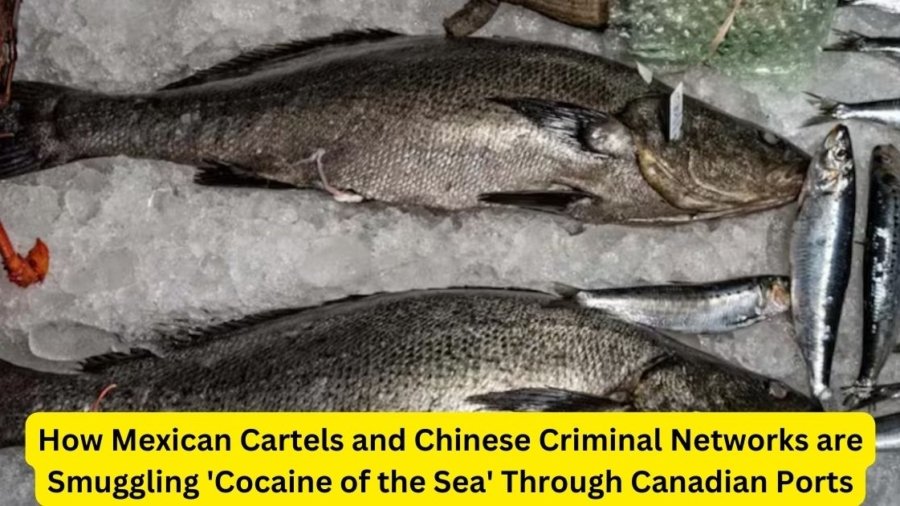By Abdul Jabbar | Bouncer News
A recent report from the Canada Border Services Agency (CBSA) has revealed that Mexican cartels and Chinese organized crime networks are using Canadian ports as key transit points for illegal trade. These criminal groups are smuggling highly valuable fish bladders in exchange for chemical precursors used in fentanyl production, a toxic opioid fueling a deadly crisis in North America.
The report, obtained by Radio-Canada through a freedom of information request, details how these networks transport totoaba, an endangered fish species, from the West Coast to China. In return, chemical ingredients needed to manufacture fentanyl are shipped through Canadian ports. The memo describes Canada as a “transit point” for these illicit operations but does not specify the volume of totoaba being smuggled or the amount of fentanyl precursors exchanged.
A Lucrative and Illegal Trade
Totoaba, a species found in the Gulf of California off Mexico’s west coast, is highly prized for its swim bladders. These bladders, sometimes referred to as the “cocaine of the sea,” can fetch up to $80,000 per kilogram on the Chinese black market. They are used in traditional Chinese medicine, cuisine, and cosmetics, driving a high demand that has led to rampant poaching.
The CBSA report warns that a newly identified criminal network, called the “Dragon Cartel,” is actively involved in totoaba smuggling. This group, consisting of both Chinese and Mexican nationals, is exploiting western Canadian ports to facilitate the illegal trade. The report also highlights that Canada is a hotspot for wildlife trafficking, with individuals engaging in illegal imports, exports, and even the breeding of protected species.
Ports at Risk
According to investigative journalist Luis Horacio Nájera, Vancouver’s port is particularly vulnerable due to its strategic connections to Manzanillo, Los Angeles, and other key markets in Asia and Europe. “As globalization expands, so does organized crime,” Nájera explained. “Criminal groups have found the perfect opportunity and infrastructure in Vancouver to facilitate their operations.”
This is not the first time Vancouver has been linked to organized crime. A 2023 statement from the U.S. Treasury Department identified the city as a crucial hub for the Sinaloa Cartel’s fentanyl distribution network.
The Challenges of Cracking Down
The CBSA report outlines the difficulties of detecting illegally traded totoaba bladders. Unlike drugs such as cocaine, which are solid and easier to identify, totoaba bladders are often smuggled alongside legally traded fish like tilapia and squid. Criminals have also developed more sophisticated hiding methods, including storing the bladders in coolers, backpacks, gasoline tanks, spare tires, and secret compartments within vehicles.
Nájera emphasized the challenges of enforcement, stating, “It’s difficult to spot the difference between legal and illegal fish products. Specialized training and enhanced detection infrastructure are crucial if authorities hope to curb this illicit trade.”
Fentanyl Smuggling and International Response
The revelation of this illegal trade comes amid heightened concerns over the fentanyl crisis. The synthetic opioid has devastated communities across North America, with over 49,000 overdose deaths in Canada since 2016. In the United States, the Centers for Disease Control and Prevention (CDC) reported more than 74,000 fentanyl-related deaths in 2023 alone.
Despite growing concerns, U.S. Customs and Border Protection (CBP) data indicates that fentanyl seizures at the Canadian border remain relatively low compared to Mexico. In 2024, CBP seized just 19.5 kilograms of fentanyl at the Canadian border, whereas nearly 9,570 kilograms were intercepted along the U.S.-Mexico border.
In response to the crisis, Canada has taken several measures, including appointing a fentanyl czar and reinforcing border security with a $1.3 billion plan. Additionally, the Canadian government is considering designating cartels as terrorist organizations.
While authorities in Canada and the U.S. continue their crackdown on fentanyl smuggling, Nájera warns that tracking the full extent of these operations is difficult. “Some of the chemical precursors entering Canada likely stay here, but a significant portion is redirected back to Mexico, particularly to ports like Manzanillo and Los Cabos.”
Strengthening Global Enforcement
The connection between Chinese criminal organizations and Mexican cartels underscores the complexity of transnational crime. According to the Brookings Institute, trade between China and Mexico exceeded $100 billion USD in 2021, providing ample cover for illicit activities.
As international crime networks grow more sophisticated, law enforcement agencies face increasing challenges in intercepting the flow of illegal goods. With Vancouver emerging as a critical hub, Canadian authorities will need to strengthen their enforcement efforts to disrupt these smuggling operations effectively.

